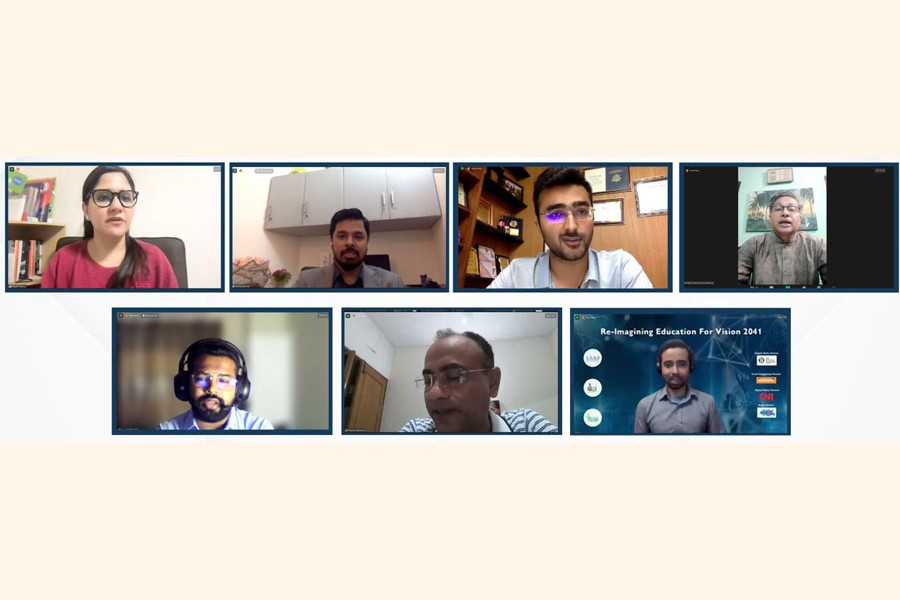The entire world has been fighting the Covid-19 pandemic for more than two years. As a result, along with other activities, our education system came to a standstill for some time. In this regard, a2i, Lead Academy, and YSSE organised a two-hour town hall meeting on March 18 titled ‘Reimagining Education for Vision 2041’ with educators and policymakers on various aspects of the current education system, including the impact of the 4th Industrial Revolution (4IR), student perspectives, and job opportunities.
At the meeting, the CPA Communication Advisor of the Access to Information (a2i) Programme, Ashfaq Zaman, delivered his speech on Vision 2041. He focused on how the education sector can be reformed by prioritising the youths' opinions.
After his speech, the representatives of the university club partners talked about how and why online education and courses are essential to cope with the contemporary world. They talked about the problems that students face during online classes, such as network problems and lack of interactions between the students and teachers. Furthermore, they also focused on paid online courses, which are not affordable for all students. However, they had drawn the attention of policymakers to make them affordable to everyone.
CEO and founder of Interactive Cares, Rare Al Samir, said that a bridge should be created between our academic and industry education. But unfortunately, many are unemployed even after graduation due to the lack of connection between the two. So, he suggested the young people look over this fact.
Then, the Chief Marketing Officer of ROOTs Edu, Shakibul Hakim, shared his opinion on how the app system online learning can solve the network problem that most rural area students face. Lastly, he appealed to the government to take appropriate steps to solve the problem of this network.
Shadman Majid, chief executive officer of Sohopathi, said that adequate training should be provided to the teachers on online classes so that they can make online classes more exciting and interactive, even if they are recorded.
After the students' view part, Abdul Hannan Chowdhury, dean, and professor, School of Business and Economics (SBE), North South University, talked on the future of education in the context of Bangladesh. According to him, to fulfil the vision of 2041, the education sector has to be improved where online education plays a significant role. Since most of the people in Bangladesh belong to the poverty line, they can't keep pace with the times by buying technological devices very fast. Therefore, he thinks that to fulfil the vision of 2041 and to take the online education system forward, first of all, we have to work on eradicating poverty.
Later, Sadaf Taimur, a doctoral researcher at the University of Tokyo and Japan chairperson of the Youth General Assembly, discussed the impact of online education on the 4th industrial revolution. She urged students to be independent learners and learn how to filter information through critical thinking. At the meeting, Ashish Thakur, executive director of Glocal Pvt Ltd, talked about digital education and remote learning. He focused on the connectivity, experience, relativity, and efficiency of the learning system.
Then, the possibilities of blended learning in Bangladesh were discussed by the associate professor and attached officer of a2i Mohammad Kabir Hossain. At the meeting, he said how they plan to work with the blended education system through online integration with the traditional education system. Mohammad Tareque Rahman, director of CETL and associate professor of the General Education Department (GED), talked about the importance of a refined role in the classroom and setting goals besides blended learning.
Afterwards, the head of Social Innovation Cluster a2i - Aspire to Innovate, Manik Mahmud, talked about Digital Education and Citizen Participation in Bangladesh.
The CPA Communication Advisor of a2i Program, Ashfaq Zaman, then, shared his opinion on market-ready interventions to address the skills gap. He emphasised the importance of developing industry-oriented courses and urged the government policymakers to take steps to ensure that the certificates obtained from online courses are evaluated.

- Saturday, 23 November 2024 |
- Today's FE |
- e-Paper |
- Beta Website

